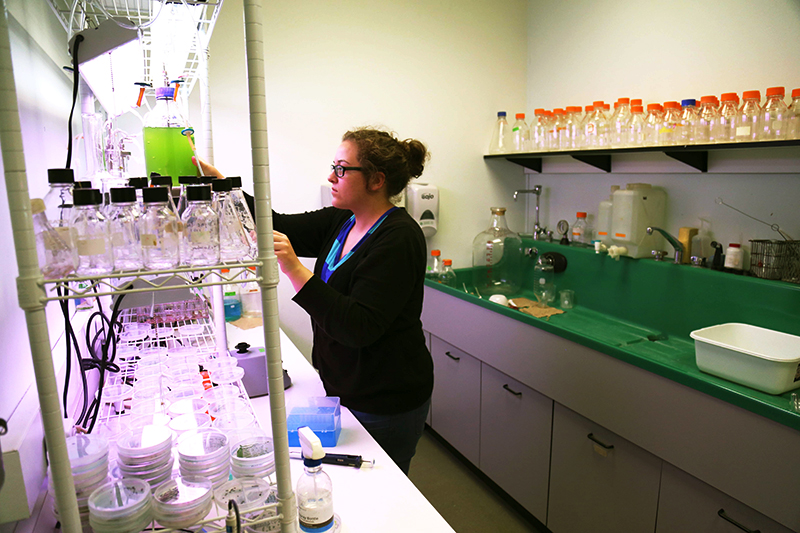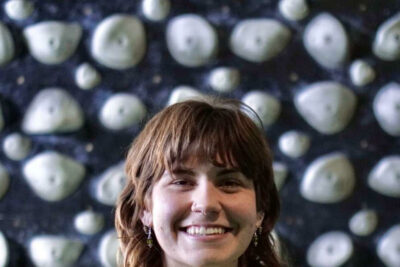Fourteen students spent the summer doing research projects across multiple disciplines.
Fourteen students made use of their summer break by staying on campus and researching alongside a faculty member with the Maple Scholars program.Maple Scholars began in 1998 as a summer research program for students to contribute to ongoing faculty projects in all areas of study.
However, Current Director of the program, John Buschert, confessed, “in the early years, you would find a lot more hard science. Even in the humanities projects, you would see a more science focus.” Buschert continued that in recent years, all the projects, sciences included, seem to be leaning more toward humanities-style research projects.
The theme for Maple Scholars in recent years has been “Interdisciplinary,” a word one was sure to hear each student’s Friday-morning group progress report.
During the 8-week Maple Scholars program, the students earn a $2500 stipend, stay on campus in a communal living situation, and work about 40 hours per week toward their project goals.
Anna van der Zwaag, a senior, worked toward efficiently extracting oils from algae to use as a power source.
“During the school year I have no time. I have so many responsibilities. I can spend maybe a couple hours per week in the lab,” van der Zwagg said, “Maple Scholars was an opportunity to devote all my time to research.”
James Garcia, a sophomore, who researched how bees and related species are affected by alcohol and how it affects their nervous systems, agreed that the concentrated time in research was a highlight of the program.
“Every day I had one on one time with the professor,” Garcia said. “I could ask all the questions I wanted and had the professor’s dedicated attention.”
But Garcia didn’t always enjoy the lab time.
“The isolation was hard sometimes. [The research] was often a slow and tedious process,” Garcia said. “You have to fail a lot. But when you finally get successful results it’s so exciting!”
But for the students working in the humanities (or the “Non-Science” or the “Wisdom” projects as they have been named in the past), the summer experience was much different.
Randy Horst, professor of art, who worked with Ida Short, a senior, on developing a series of self-portraits, said that in the arts, “the students can generate what they are interested in. The program allows us to explore what it means to be an artist in greater detail and springboard the student farther than during the semester.”
Short loved having dedicated studio time all summer and having the freedom to try new things. “When I have ideas,” Short said, “I could pursue them fully without having to adhere to guidelines of a specific class.”
Now Short is excited and more prepared for her senior show coming up later this school year.
For Eric Bradley, a reference and instruction librarian at Goshen College, the Maple Scholars program was all about making use of available resources and creating an interdisciplinary experience.
“We’ve had all the equipment to produce online content,” Bradley said. “Maple Scholars brings a student to use these resources and contribute to our mission.”
As Bradley’s Maple Scholar, Kolton Nay, a senior, was able to use technological skills, programming languages, history, mathematics, and linguistics to digitize the past issues of The Record and conduct a gender study analysis of the texts.
“This is a project,” Bradley said, “that really embodies what Maple Scholars is all about.”
Also in the humanities portion of the Scholars, Natalie Hubby, a junior, focused on organizing archival material on the women of the Mennonite World Conference and re-representing it in a digital exhibit. Through her experience, she discovered that this line of work was an excellent career path for her.
“It was great having the experience of actually doing this work instead of just learning about it,” Hubby said.
She created an online webpage compilation of her work that she hopes other young researchers will then use as a source in their own studies.
To get involved next summer, Buschert suggests that interested students simply talk to their professors.
“You just need to get in contact and ask what they are working on,” Buschert said. “Participate and get involved.”
Faculty will propose Maple Scholar projects in December, and students will have until early February to apply to a specific project of their interest.
2014 Maple Scholars Program Listing
Student
Professor
Project
Garret Ahlgrim
David Housman
Game Theory – Limit Cycles
Chau Bui
Seth Conley
Digital Mission
Abby Deaton
Kyle Hufford
Goshen Spotlight
James Garcia
Andy Ammons
Pheromones & Drunk Bees
Natalie Hubby & Liz Wittrig
John Roth
Mennonite World Conference Archival
Kolton Nay
Eric Bradley
Record Digitalization & Gender Study
Joel Pepala
David Housman
Game Theory – Weighted Voting
Jack Shomberg
Dale Hess
Restoration Agricultural Research
Ida Short
Randy Horst
Self-Portrait
Ben Shelly
Dave Ostergren
Traditional Ecological Knowledge
Lauren Treiber
Bob Yoder
Alumni Faith at GC
Micheal Yoder
Kris Schmidt
Tagging UNC-53/NAV-2
Anna van der Zwaag
Stan Grove
AlgaeTown 2014

